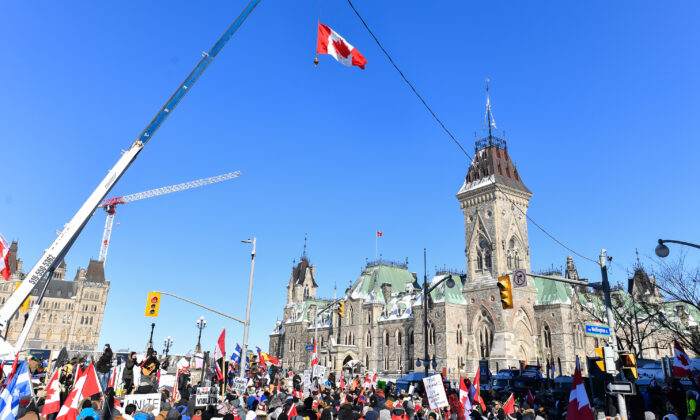
Thousands gather around Parliament Hill in support of the Freedom Convoy truck protest in Ottawa on Feb. 5, 2022. (Minas Panagiotakis/Getty Images)
By
Public Safety Minister Marco Mendicino told the Emergencies Act inquiry on Nov. 22 he couldn’t recall when he became aware of RCMP Commissioner Brenda Lucki’s advice that not all tools had been exhausted to clear the cross-country protests and blockades.
Lucki wrote an email to Mendicino’s chief of staff Mike Jones before the Liberal cabinet meeting on the evening of Feb. 13, in which she listed tools that could be useful to deal with the situation.
“I am of the view that we have not yet exhausted all available tools that are already available through the existing legislation,” Lucki wrote at the end of her email.
Mendicino was asked whether he had seen that email before the cabinet meeting.
“I don’t recall exactly when I would have seen it,” said Mendicino.
“The commissioner did not express that opinion to me at any time directly, and I actually spoke to the commissioner earlier that day.”
Mendicino told the commission that his conversation earlier on Feb. 13 had revolved around the situation in Coutts, Alberta, where the RCMP was investigating individuals allegedly in possession of firearms and said to be willing to use force against police if they moved to clear the border blockade.
The minister said that based on that conversation, he couldn’t draw any other inference that Lucki was supportive of invoking the Emergencies Act.
After Mendicino addressed the situation in Coutts, commission counsel Shantona Chaudhury sought to obtain further clarification on the advice Lucki had sent to Jones.
“You didn’t see this email from Commissioner Lucki before the cabinet meeting?” she asked again.
“I’m trying very much to reconstruct the sequence of events, things move very, very quickly. It literally came in inside of a half hour of the commencement [of the cabinet meeting]. So I don’t want to say definitively I didn’t see it,” said Mendicino.
The minister said that Lucki did not speak at the cabinet meeting. The commission heard during the hearings that cabinet meetings are managed by Prime Minister Justin Trudeau and participants like Lucki would only speak if called to.
Mendicino reiterated that he was more preoccupied with what he had heard from Lucki about Coutts, which he called a “threshold moment.”
Threshold
The minister explained how he believed the threshold had been met to invoke the Emergencies Act, but he mixed two pieces of legislation.
He said it required looking “at the broader objective and scope of the Emergencies Act, which means looking at section 2 of that statute, where it talks about the presence of a serious threat or threat of serious violence, so as to exceed the capacity of any province to respond on the basis of authorities that exist.”
The public emergency order section of the Emergencies Act refers to threats to national security as defined by section 2 of the CSIS Act, with section 2c addressing the threat of serious violence.
And section 3 of the Emergencies Act addresses situations that exceed provincial capacity.
“And so in my judgment, you need to kind of look at both. And that was precisely the skillset that I was applying in my role as minister of public safety, drawing on my understanding of the law, and the principles as they were being applied to the facts that existed on the ground at the time,” he added.
Other federal officials testifying before the commission have provided different interpretations of how the threshold was met to invoke the act.
National Security and Intelligence adviser Jody Thomas said on Nov. 17 that the CSIS Act was too narrow and that other “threats” needed to be taken into account, such as the “inability to conduct a livelihood in the city of Ottawa.”
Canadian Security Intelligence Service (CSIS) Director David Vigneault said on Nov. 21 the protests didn’t meet threat definitions under its mandate, but he still advised Trudeau that the Emergencies Act should be invoked based on broader factors.
Deputy Clerk of the Privy Council Nathalie Drouin said on Nov. 18 the main ground for the invocation was section 2c of the CSIS Act, which refers to serious violence or threats of serious violence for ideological motives, in opposition to CSIS’s own assessment.
RCMP Commissioner Brenda Lucki did not comment on the threshold for invoking the act, but she said on Nov. 15 she didn’t see the protests as a national security threat.